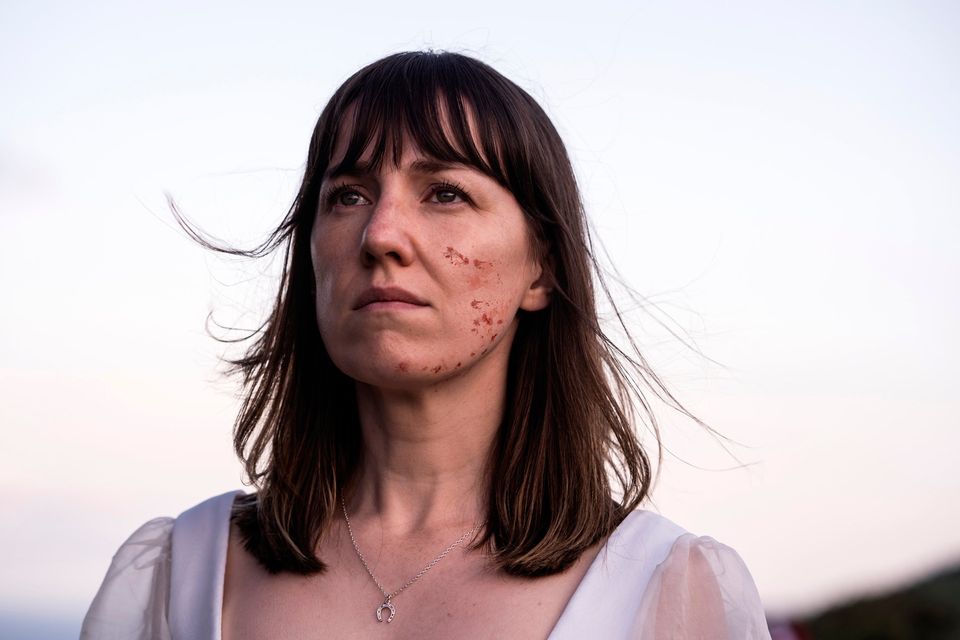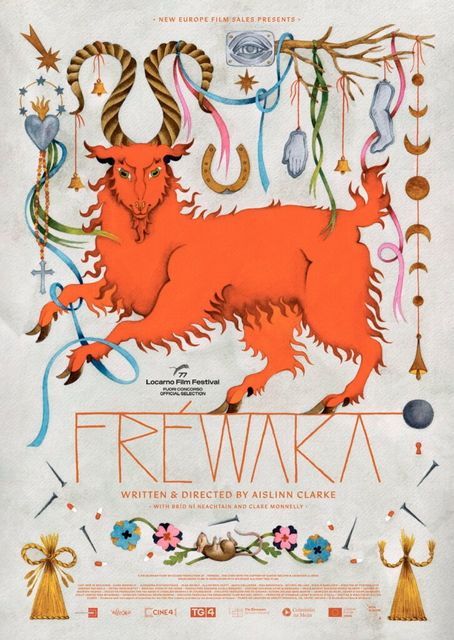The director of a new Irish-language horror which is set to open the 24th Belfast Film Festival next month has said she attempts to use the genre as a way to explore “Irish trauma”.
Aislinn Clarke (43), who is from south Armagh but has lived in Belfast for almost 30 years, has worked steadily in television, theatre and film but is now preparing for her big breakout with the premiere of Fréwaka, which has already received critical acclaim.
The feature film, the title of which means ‘roots’ in Irish and is pronounced ‘fruh-wacka’, follows home care worker Shoo (Clare Monnelly), who is sent to a remote village to care for an agoraphobic woman, called Peig (Bríd Ní Neachtain), who fears the neighbours as much as she fears the Na Sídhe — sinister entities who she believes abducted her decades earlier.
“As the two develop a strangely deep connection, Shoo is consumed by the old woman’s paranoia, rituals and superstitions, eventually leading her to confront the horrors from her own past,” the official plot synopsis reads.
The film features an all-female cast and its dialogue is completely in Irish.
Fréwaka has already received rave reviews at festivals, with praise in particular given to Clarke’s direction, much like her first feature, The Devil’s Doorway (2018), a found-footage horror film which garnered industry plaudits.
It’s also been billed, despite the director’s caution, as the first Irish-language horror movie, and it is set to open the Belfast Film Festival on, appropriately, Halloween night.
“I was taught two things when I was growing up: my love for the Irish language and a love for film,” the director said.
“I was raised and totally educated in Irish. Even my play school was in Irish and I studied it right up until I changed it to film.”
“It’s been life and my upbringing — so, obviously, when I started making films, it was a no-brainer for me.
“The idea that it was a horror film that was going to be in the Irish language came before the film itself. It has amazed me, given our background in Ireland, that it’s taken this long for Irish horror to really come to the forefront.”
Clare Monnelly in Fréwaka
Despite its genre, Fréwaka explores deep issues including but not limited to the Irish famine, the Magdalene Laundries and violence against women.
Without spoiling the plot, the film makes a strong point about how issues of the past are still yet to be addressed in modern times.
“Everyone has their own lens on what it means to be Irish, and this is mine. It’s my view on Ireland’s historical traumas. The broader theme is the new Ireland meeting the old Ireland, between the two lead characters,” Clarke added.
“Long before we had horror films, we had ghost and fairy stories, and I think [horror] serves a unique function in that it can explore trauma.
“It’s using metaphors and the distances in storytelling to explore issues that are otherwise very difficult.
“The whole point of the film is that we haven’t left our trauma in the past; we still have our baggage.
“But while the film is very female focused, it’s not women-specific — the issues that it’s dealing with are broader than that. Inherited trauma is very broad.”
Fréwaka will open the Belfast Film Festival on 31 October
Fréwaka is being supported by distribution company Wildcard, the same team behind Kneecap’s recent Irish-language comedy semi-biopic.
Fréwaka was filmed in a rural home near Newry, close to where Clarke grew up, and although the site wasn’t intentional, the director found a strange link to her past within it.
She explained: “We looked at a lot of locations. It wasn’t intentional that it was close to where I grew up. In fact, we were looking at filming it in Donegal at one point.
“But, as with all independent films, it was stripped back, attempting to be limited in resources but not limited in scope.
“It was shot near Ravensdale, a location found by a producer. When we arrived at the house that we shot in, I had this odd sense of déjà vu. We then found out that I had actually been there before, at a party, when I was around 21 years old. It was a very odd experience.”
In addition to Fréwaka receiving glowing reviews in Variety and the Hollywood Reporter, its upcoming screenings at the BFI London Film Festival sold out in a matter of hours.
“The reaction has been very good,” Clarke remarked.
“You always hope you make something good and that it will find its people… but you just never know. But it’s nice to know it’s getting a nice response.”
Fréwaka will open the 24th Belfast Film Festival on October 31

